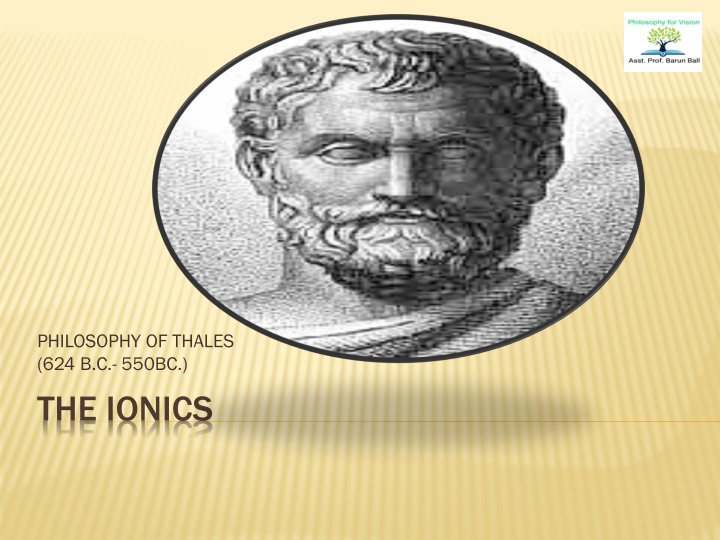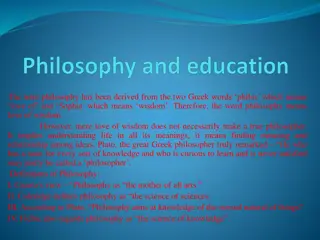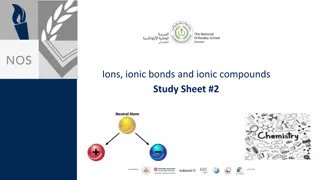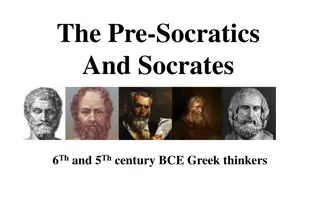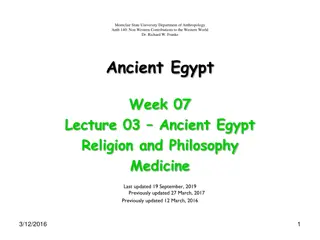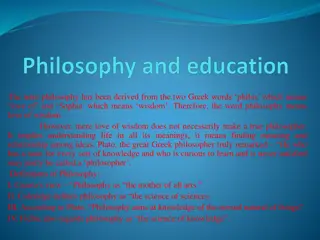Philosophy of Thales: The Ancient Wisdom of the Ionic School
Thales of Miletus, a key figure in the Ionic School of philosophy, is considered the father of philosophy. He believed that water was the principle of all things and made significant contributions to mathematics and astronomy. Thales's wisdom and engineering feats, such as diverting the river Halys, showcase his innovative thinking. His philosophical thoughts on water and the earth continue to influence philosophical discourse.
Download Presentation

Please find below an Image/Link to download the presentation.
The content on the website is provided AS IS for your information and personal use only. It may not be sold, licensed, or shared on other websites without obtaining consent from the author.If you encounter any issues during the download, it is possible that the publisher has removed the file from their server.
You are allowed to download the files provided on this website for personal or commercial use, subject to the condition that they are used lawfully. All files are the property of their respective owners.
The content on the website is provided AS IS for your information and personal use only. It may not be sold, licensed, or shared on other websites without obtaining consent from the author.
E N D
Presentation Transcript
PHILOSOPHY OF THALES (624 B.C.- 550BC.) THE IONICS
IONICS SCHOOL The earliest Greek philosophers belong to what in after times came to be called the Ionic School. The name was derived from the fact that the three chief representatives of this school .
FIRST: THALES 624 B.C. 550 B.C.
SECOND: ANAXIMANDER (610-547 BC)
LAST: ANAXIMENES (585-525 BC)
THALES Thales of Miletus is generally accounted the founder and father of all philosophy. He was born about 624 B.C. and died about 550 B.C. These dates are approximate. He was a contemporary of Solon and Croesus.
Solon was an Athenian statesman, lawmaker and poet. He is remembered particularly for his efforts to legislate against political, economic and in archaic Athens. moral decline SOLON SOLON (638 (638 BC BC- - 558 558 BC) BC)
Croesus Croesus was the king of Lydia who, according to Herodotus, reigned for 14 years: from 560 BC until his defeat by the Persian king Cyrus the Great in 546 BC (sometimes given as 547 BC). Gold around 550 BC, from modern Turkey. coin of Croesus, Lydian, CROESUS CROESUS (595 BC (595 BC C. 546 BC) C. 546 BC)
THALESS WISDOM He antiquity mathematical astronomical learning. An eclipse of the sun occurred in 585 B.C. and Thales is alleged to have predicted it. was famous for in his and
GREAT ENGINEER He caused a diversion of the river Halys, when Croesus and his army were unable to cross it.
PHILOSOPHICAL THOUGHT Firstly, that the principle of all things is water, that all comes from water, and to water all return. Secondly, that the earth is a flat disc which floats upon water.
TWO QUESTIONS Why did Thales choose water as the first principle? And how was the universe formed out of water?
Most likely he never asked himself the question, and gave no explanation.
SIGNIFICANCE OF HIS PHILOSOPHY We may naturally ask why, on account of such a crude and undeveloped idea, Thales should be given the title of the father of philosophy?
The significance of Thales is not that his water philosophy has any value in itself, but that this was the first recorded attempt to explain the universe on naturalistic principles, without the aid of myths and anthropomorphic gods. and scientific
The fundamental thought of that period was, that under the multiplicity of the world there must be a single ultimate principle. Thus Thales asserted that the ultimate reality is water.
Ionic philosophers were all materialists. They are also sometimes called Hylicists, from the Greek hule which means matter.
